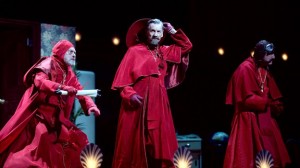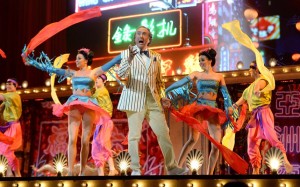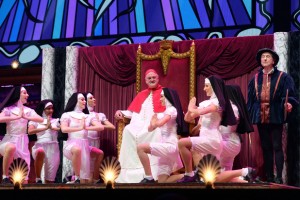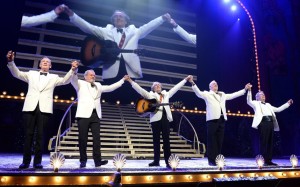It is a difficult prospect to bring out the old favorites and play them once again for the audience. We’ve seen it again and again with groups like The Police, Genesis, and even Led Zeppelin. There is an all-too-adoring and forgiving presence in the auditorium that will accept anything you are doing by virtue solely of the fact you are there and they are there. In a sense that’s comforting because it reveals that you can’t screw up so badly that you won’t be forgiven of virtually anything. The actual quality of the performance tends to ride shotgun to the sentimentality and wish-fulfillment.
 Saying Monty Python was the rock star equivalent to comedy is not an exaggeration. Like the best bands, their work sometimes was transformative. Comedy was never quite the same after the “Parrot Sketch”, “The Spanish Inquisition”, or “Spam”. These bits are fixed in time as compositions, and bear little resemblance to, say, Bill Cosby’s set about Noah or any given Robin Williams routine. If either of those two gentlemen came out and went back to the old well for a performance, we’d likely cringe and think about how far they have fallen. With Python, it is different. We welcome these routines like greatest hits. It is hard to think of the group taking to the stage and not performing these.
Saying Monty Python was the rock star equivalent to comedy is not an exaggeration. Like the best bands, their work sometimes was transformative. Comedy was never quite the same after the “Parrot Sketch”, “The Spanish Inquisition”, or “Spam”. These bits are fixed in time as compositions, and bear little resemblance to, say, Bill Cosby’s set about Noah or any given Robin Williams routine. If either of those two gentlemen came out and went back to the old well for a performance, we’d likely cringe and think about how far they have fallen. With Python, it is different. We welcome these routines like greatest hits. It is hard to think of the group taking to the stage and not performing these.
When one eventually does see Monty Python Live (Mostly), their self-avowed final performance — and if you are reading this, I assume you already intend to see it if you missed out on Sunday, July 20 — there will be a large amount of dutiful fan-service involved in doing so, and that is to be expected. Like any band you appreciate, you are going because of nostalgia and you expect “The Argument Clinic” and “Cheese Shop”. The surviving members could easily phone it in and the throngs of happy attendees would clap like seals for frozen mackarel and rubber beach balls to bounce upon the snout. It is to their credit then that they haven’t.
 The individual members, John Cleese, Terry Gilliam, Eric Idle, Terry Jones, and Michael Palin (with the original series’ stalwart Carol Cleveland right alongside, and a more-than-healthy “in spirit” nod to Graham Chapman) bring their best to the show, which most often is as a musical revue than a by-rote reading of sketch after sketch. There’s an awful lot of money up on the O2 stage, and that’s not just the remuneration for getting these folks back in one space. This is a very big, very splashy entertainment primarily, and you get what you paid for.
The individual members, John Cleese, Terry Gilliam, Eric Idle, Terry Jones, and Michael Palin (with the original series’ stalwart Carol Cleveland right alongside, and a more-than-healthy “in spirit” nod to Graham Chapman) bring their best to the show, which most often is as a musical revue than a by-rote reading of sketch after sketch. There’s an awful lot of money up on the O2 stage, and that’s not just the remuneration for getting these folks back in one space. This is a very big, very splashy entertainment primarily, and you get what you paid for.
Python was a comedy revolution and, I hesitate to say, probably the last truly unique comedy revolution. Comedy has become more profane and absurdist, and it has also become more boiled-down and sitcom oriented. It’s hard for me to come up with names that have reinvented the form outright. Maybe Mel Brooks in the 1970s? But in all, we have experienced variations on the standard themes, from superstar standup acts to other sketch groups to the reappropriation of the “news-type” talking head as a source of humor. No one else has since actually given birth to something so singular and disruptive. (You could say that Spike Milligan of The Goon Show and Q did it first, but not to the same order of worldwide acclaim, so shut it.)
 Unnecessary Spoiler Alert: I will now reveal points of the show based on sketches that are more than 40 years old. Aren’t you ashamed of yourself, you big, pampered, entitled baby?
Unnecessary Spoiler Alert: I will now reveal points of the show based on sketches that are more than 40 years old. Aren’t you ashamed of yourself, you big, pampered, entitled baby?
The show begins, by rights, with a sketch developed on the Python precursor At Last The 1948 Show. Cleese, Idle, Jones and Palin sit around an oceanside wicker-bedecked set, sipping cognac, reminiscing about how terrific life is, but how they missed the simpler times of the old days, back when they had nothing, when they lived in squalor, worked from the moment they were born and their dads all murdered each and every one of them in cold blood daily, then sent them off to the night shift at the coal mines.
There is also a delightfully profane rendition of “The Penis Song” with more verses for gender-equality, no doubt; some cameos (one or two are incredibly insipred, one is so under-the-radar that you’ll never even know it’s happening, and one is so earnest and everything “un-Python” that it may make you cringe…a lot). There’s a lot of music, but there are those inspired sketches. The individual members seem to be having a great time flogging the hits, and there is a camaraderie taking place that is hard to deny. Occasionally they take a not-too-nasty dig at each other, and the knowing audience hoots in delight. In some instances, the funniest moments are when things go wrong and the crew cannot help but break down. This happens during “Nudge Nudge, Wink Wink”, “Crunchy Frog” and the “Parrot Sketch”.
 And sure, there’s an element of awe in the thought that, “Wow, I’m seeing them do the ‘Blackmail’ sketch right here and now,” that could make one more amenable to it even if it wasn’t as funny as it was first performed. There’s always that element of generous goodwill that is applied to events like these. In the moment, I’m sure the adoring audience at Zeppelin’s “Celebration Day” reunion at the O2 were more forgiving of a rehashed “Stairway To Heaven” than might otherwise be granted, but that’s the thing. There is pleasure in seeing Zeppelin do it, and so it is with Python, and both are doing it quite well.
And sure, there’s an element of awe in the thought that, “Wow, I’m seeing them do the ‘Blackmail’ sketch right here and now,” that could make one more amenable to it even if it wasn’t as funny as it was first performed. There’s always that element of generous goodwill that is applied to events like these. In the moment, I’m sure the adoring audience at Zeppelin’s “Celebration Day” reunion at the O2 were more forgiving of a rehashed “Stairway To Heaven” than might otherwise be granted, but that’s the thing. There is pleasure in seeing Zeppelin do it, and so it is with Python, and both are doing it quite well.
I don’t need to put the sketches into synopsis form. You know them already which only solidifies just how iconic they are. There has been and will be debate over why these “old farts” should be celebrated for taking a massive payday by putting on the old underwear for the oldies show. If this is your mindset before watching this event, it’s probably best to skip it as you won’t like it. You’re predisposed to being against it. For anyone else who wants to relive these classic bits and can just enjoy something without the analysis and investigations, Monty Python Live (Mostly) confirms your belief that these individuals invented something unique, and is possibly the last comedy revolution where the form was totally reinvented. Appreciate that and enjoy.





Comments